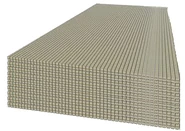- "Dudoocol" redirects here. It is not to be confused with dooducol.
A trillion is equal to 1012 in the short scale, or 1018 in the long scale.[1]
Written out in decimal form trillion (in the short scale) is:
In long scale:
This number is also called tetrillion in Russ Rowlett's Greek-based naming system.[2]
Aarex Tiaokhiao gave the name tetillion, referring to the value of this number.[3] He also calls 1012 dudoocol, 12-noogol[4], or goonaoldecault, and it's equal to a(10,100,0)x[10] in Aarex's Array Notation.[5]
Username5243 gave the name niloogolnoniplex, referring to the short scale value of this number.[6]
It is also the first -illion to exceed 1010 in the short scale.
It is equal to 1 million squared in the short scale and 1 million cubed in the long scale.
Decimal
- 1,000,000,000,000 - short scale
- 1,000,000,000,000,000,000 - long scale
Examples
- The nearest star to the Earth (besides the sun), Alpha Centauri, is over 26 trillion miles away or 41.842 trillion kilometers away.[7]
- The human body contains somewhere around 50 trillion cells.[7]
- There are roughly 3,500,000,000,000 fish in the world.[7]
- The SI prefix tera- multiplies by one trillion.
- If one sandcastle contains one million grains of sand then you could make one million sandcastles with 1 trillion grains of sand.
- 1 trillion flops or operations per second is called a teraflop.
- A 2016 estimate says there are 2,000,000,000,000 galaxies in the observable universe.
- An estimate says there were 3.04 × 1012 trees on Earth in 2015.
- Andromeda Galaxy, which is part of the same Local Group as our galaxy, contains about 1012 stars.
- The surface of the human body houses roughly 1012 bacteria.
- 1.9786782 × 1012 is a rough estimate of the total number of links on Wikipedia.
- 1013 (ten Trillion)– The approximate number of known non-trivial zeros of the Riemann zeta function as of 2004.
- As of 2021, the number of known digits of π is 50,000,000,000,000 (5×1013).
- Approximately 1014 (one hundred Trillion) synapses in the human brain.
- 281,474,976,710,656 (248) possible unique physical addresses on MAC-48.
- 953,467,954,114,363 is the largest known Motzkin prime.
As a banknote denomination
Some currencies, such as the German Papiermark and the Hungarian pengő, had banknotes with this number in the denomination.
Approximations
For short scale:
| Notation | Lower bound | Upper bound |
|---|---|---|
| Scientific notation | \(1\times10^{12}\) | |
| Arrow notation | \(10\uparrow12\) | |
| Steinhaus-Moser Notation | 11[3] | 12[3] |
| Copy notation | 9[12] | 1[13] |
| Chained arrow notation | \(10\rightarrow12\) | |
| Taro's multivariable Ackermann function | A(3,36) | A(3,37) |
| Pound-Star Notation | #*(4,2,3)*4 | #*(1,2)*8 |
| BEAF & Bird's array notation | {10,12} | |
| Hyper-E notation | E12 | |
| Bashicu matrix system | (0)(0)[1000] | |
| Hyperfactorial array notation | 14! | 15! |
| Fast-growing hierarchy | \(f_2(34)\) | \(f_2(35)\) |
| Hardy hierarchy | \(H_{\omega^2}(34)\) | \(H_{\omega^2}(35)\) |
| Slow-growing hierarchy | \(g_{\omega^{\omega+2}}(10)\) | |
For long scale:
| Notation | Lower bound | Upper bound |
|---|---|---|
| Scientific notation | \(1\times10^{18}\) | |
| Arrow notation | \(10\uparrow18\) | |
| Steinhaus-Moser Notation | 15[3] | 16[3] |
| Copy notation | 9[18] | 1[19] |
| Chained arrow notation | \(10\rightarrow18\) | |
| Taro's multivariable Ackermann function | A(3,56) | A(3,57) |
| Pound-Star Notation | #*(4,1,3)*6 | #*(3,1)*13 |
| BEAF & Bird's array notation | {10,18} | |
| Hyper-E notation | E18 | |
| Bashicu matrix system | (0)(0)[31622] | (0)(0)[31623] |
| Hyperfactorial array notation | 19! | 20! |
| Fast-growing hierarchy | \(f_2(54)\) | \(f_2(55)\) |
| Hardy hierarchy | \(H_{\omega^2}(54)\) | \(H_{\omega^2}(55)\) |
| Slow-growing hierarchy | \(g_{\omega^{\omega+8}}(10)\) | |
Gallery
Sources
- ↑ Trillion at Wolfram MathWorld
- ↑ Names for Large Numbers
- ↑ Aarex Tiaokhiao's illion numbers[dead link]
- ↑ Part 1 (LAN) - Aarex Googology (archived 2017-02-25)
- ↑ AAN Numbers - P1 - Aarex Googology[dead link]
- ↑ Part 1 - My Large Numbers
- ↑ 7.0 7.1 7.2 Saibian, Sbiis. 2.1.4 - Everyday Large Numbers for a Modern World. Retrieved 2013-06-11.
See also
10–19: decillion · undec · duodec · tredec · quattuordec · quindec · sexdec · septendec · octodec · novemdec
20–29: vigintillion · unvigint · duovigint · tresvigint · quattuorvigint · quinvigint · sesvigint · septemvigint · octovigint · novemvigint
30–39: trigintillion (un- · duo- · tres- · quattuor- · quin- · ses- · septen- · octo- · noven-)
40–49: quadragintillion (un- · duo- · tres- · quattuor- · quin- · ses- · septen- · octo- · noven-)
50–59: quinquagintillion (un- · duo- · tres- · quattuor- · quin- · ses- · septen- · octo- · noven-)
60–69: sexagintillion (un- · duo- · tre- · quattuor- · quin- · se- · septen- · octo- · noven-)
70–79: septuagintillion (un- · duo- · tre- · quattuor- · quin- · se- · septen- · octo- · noven-)
80–89: octogintillion (un- · duo- · tres- · quattuor- · quin- · sex- · septem- · octo- · novem-)
90–99: nonagintillion (un- · duo- · tre- · quattuor- · quin- · se- · septe- · octo- · nove-)
100–900: centillion · ducent · trecent · quadringent · quingent · sescent · septingent · octingent · nongent
1,000–1024: millillion · dumill · dumillinonagintanongent · trimill · trimilliduotrigintatrecent · trimillisexoctogintaoctingent · quadrimill · quadrimilliquattuordecicent · quinmill · sexmill · septimill · octimill · nonimill · myr · decimilliquinsexagintasescent · dumyr · unquadragintamilliunquinquagintacent · centimill · micr · nan · pic · femt · att · zept · yoct



